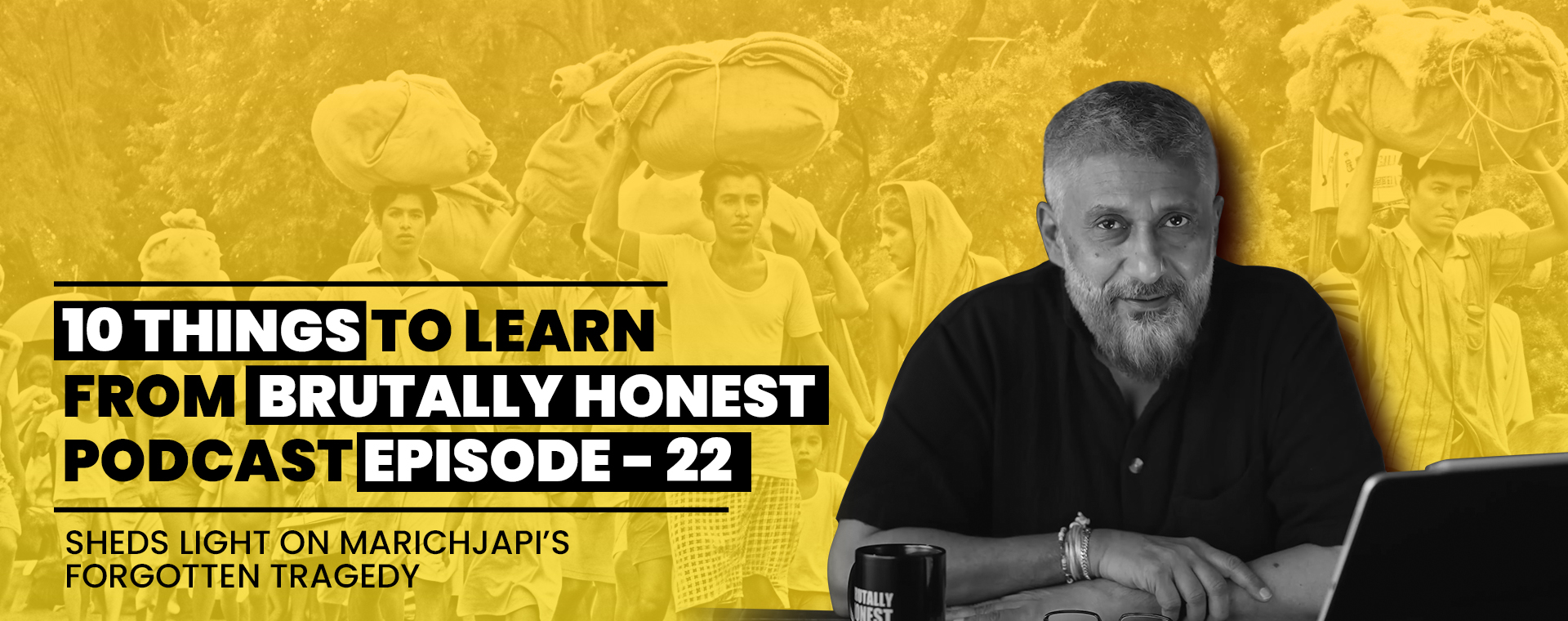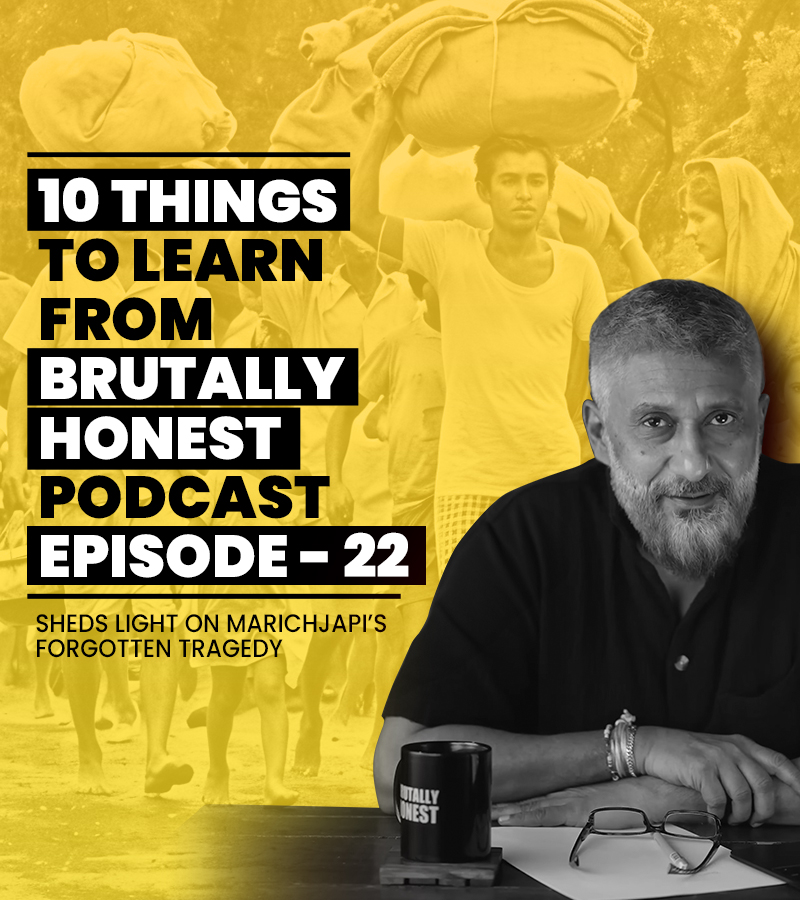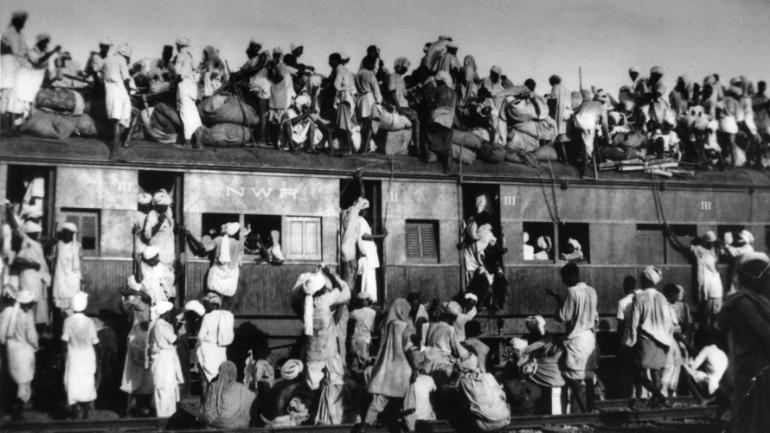

10 Things to Learn from Vivek Agnihotri’s Podcast on the Truth of Marichjapi Killings
The massacre is a cautionary tale of remembering the past to build a more responsible and democratic future.
One of the most undiscussed tragedies of India, the Marichjapi massacre of 1979, left a jarring mark on our country’s history. Episode 22 of Vivek Ranjan Agnihotri’s podcast Brutally Honest sheds light upon the incident that shook the land West Bengal stood on, where thousands of Bengali citizens endured the pain of violence, displacement, and death. Allegedly politically motivated, the massacre tangled ideology, human rights, and the battle for power and made many question the definition of democracy in India.
We unpack the key takeaways from the episode, unveiling lessons about the tragedy and, more significantly, unanswered questions about justice, accountability, and memory in Indian democracy.

Image credit: www.indiatoday.in
1. What Happened in Marichjapi?
The Marichjapi massacre wasn’t an isolated tragedy but deeply rooted in the history of refugee crises in India, particularly following the Partition of Bengal in 1947. Numerous citizens were displaced from Bangladesh (then East Pakistan) and had to take refuge in India. Several Dalits sought to reclaim their dignity after years of hardship in government camps by settling on the island of Marichjapi. But this displacement soon translated to conflict with the ruling Left Front government in West Bengal, which viewed their settlement as illegal.
History always repeats itself, mainly when conflicts such as displacement, poverty, and political disenfranchisement are not addressed appropriately. Educating ourselves with the historical background of Marichjapi empowers us to understand the refugee crisis, shrouded with political agendas and resulting in one of India’s most brutal but unfortunately forgotten tragedies.
2. The Refugee Crisis in West Bengal
The post-Partition crisis in West Bengal displaced millions from what is now known as Bangladesh. These refugees, even before the displacement, especially the lower castes, were mainly neglected by the state. The Dalit refugees who chose to settle in Marichjapi were among the ones who suffered abominable treatment in government camps. This displacement was a fresh start for many, a chance to escape, but it led to even more pain.
This tragedy is a reminder of the vulnerabilities that the refugees face. They aren’t just deprived of a place to call home but also their dignity and right to self-determination. The failure of the system to recognise this need is a recurring theme in global politics.
3. Did the Government Influence the Massacre?
In this episode, Agnihotri touches upon what drove the Left Front government to take part in the orchestration of this massacre. The government, led by the Communist Party of India (Marxist), perceived the refugee settlement as threatening its political base. By violently suppressing the Marichjapi settlers, the state conveyed its desire for control, even at the cost of human lives.
The need for political power often overpowers the needs of the marginalized groups. And the Marichjapi massacre is a testament to the dangers of prioritizing political reign over human welfare. This misuse of state machinery to suppress opposition is a prevalent issue that clouds today’s political landscape.
4. The Contradiction of Ideologies
Agnihotri also dissects the notion of this particular tragedy being a contradiction of ideologies. The Left Front government, which campaigned to represent the oppressed and marginalized, was quick to brutalize Dalit refugees, a group that’s already been through enough. He speaks about the paradox that the government presented, painting themselves as pro-poor while enacting policies that directly put the vulnerable under fire.
Ideology purity is often a mask worn by realpolitik. The massacre is a prime example that political parties act according to their interests rather than those of the public.
5. A Brutal Violation of Human Rights
The Marichjapi massacre is a violent display of human rights violations. Forcefully evicting the settlers and brutally repressing them through mass killings, starvation, and denial of basic necessities proved to be one of the most appalling state-backed human rights violations. Agnihotri touches upon the heart of these abuses, explaining how the system, under the veil of law and order, injected violence into the citizens.
These particular violations shatter the foundation on which our democracy stands. The Marichjapi tragedy is a reminder that there are several incidents that the government must be held accountable for, especially against marginalized populations.
6. Did the Media Oppress the Truth?
One of Agnihotri’s most startling comments in this episode is regarding the mainstream media’s role in spreading misinformation. He explains how the government dictated a certain narrative that the media supported by downplaying the violence and its coverage. This suppression is a form of misinformation, forcing the massacre to become a forgotten tragedy in the history books.
As a democracy, our right to free and independent media ensures that the system is held accountable on our behalf. When the press joins a corrupt system, injustice sways above our heads like a sharp-edged sword. The Marichjapi case demonstrates how journalistic integrity is essential in shaping public opinion.
7. Long-Lasting Impact on Survivors
We can never imagine what the survivors went through; for them, it wasn’t just a moment in history but rather an incident that completely changed their lives. Many of them continue to suffer the trauma of losing loved ones, homes, families, and communities. Agnihotri speaks about the long-term effects of such tragedies that shatter individuals, especially when justice and recognition are unfound.
The aftermath is sometimes more heartbreaking than the tragedy itself, as it shows the pieces left to pick up. Those who have gone through egregious events deserve long-term support systems and the opportunity to keep their stories alive.
8. The Significance of Remembering Marichjapi
To keep their stories alive, we need to ensure that such tragedies aren’t forgotten. Forgetting them allows the cycle of violence and unaccountability to continue. Such tragedies need to be an acknowledgment of past wrongs and a way for future generations to learn from them. By keeping these stories alive, we ensure that accountability is also alive and taken if, god forbid, such events happen again.
9. Lessons on Political Power and Accountability
The most significant lesson we can take away from the Marichjapi massacre is the lack of responsibility from those in power. Despite the horrors that occurred, no action was taken to hold any of the political leaders accountable. This blatant show of power will always remain an act of injustice towards the survivors and those who lost everything.
Suppose we don’t push the system to take action. In that case, this particular tragedy and many more will be a glaring example of how political power can act as immunity for those in authority.
10. The Broader Implications for Indian Democracy
And lastly, Agnihotri claims that the Marichjapi massacre is not just a regional issue but instead makes us question the health of the Indian democracy as a whole. When the state can use violence against its own citizens, especially those who can’t fight back, it makes us question our safety under the umbrella of democracy.
If we don’t ask the right questions, no one will. The Marichjapi massacre highlights the need for constant vigilance and active participation from all citizens to ensure that democratic principles are upheld.
Lessons from Marichjapi for Today’s World
This particular episode from Vivek’s Ranjan Agnihotri’s podcast is more than simply a history lesson. It encourages us to reflect on the state of politics, power, and human rights in India. We aren’t short of challenges in today’s world, but Agnihotri reminds us that powerful lessons from the past can help us become more sharp-eyed toward a democratic future.
Please click here if you’d like to listen to the entire episode and share your thoughts.






